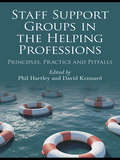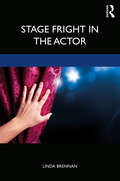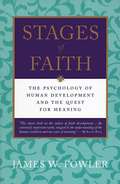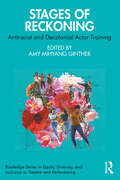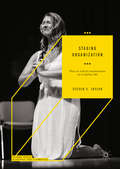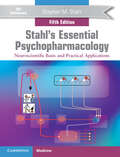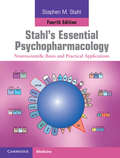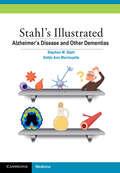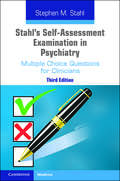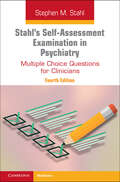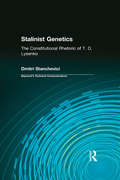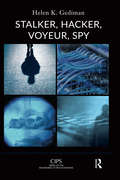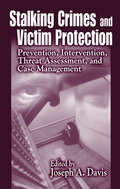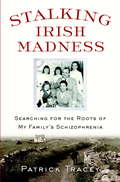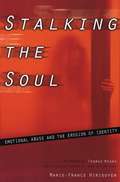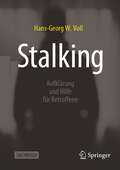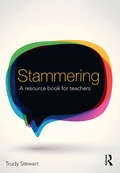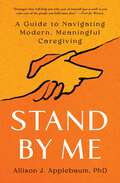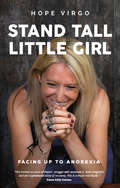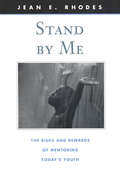- Table View
- List View
Staff Support Groups in the Helping Professions: Principles, Practice and Pitfalls
by David Kennard Phil HartleyStaff burnout and work-related stress in mental health professionals cost the National Health Service not only millions of pounds each year, but also impact upon the welfare of those being cared for. Staff Support Groups in the Helping Professions takes the lead from recent Department of Health initiatives, promoting the use of staff support groups to foster emotional resilience, deal with potential conflict and support reflective practice. In this book Hartley, Kennard and their contributors explore the influences that help and hinder the setting up and running of staff support groups, and attempt to counter the often negative reactions that the term 'staff support' can evoke. They demonstrate that such support groups can be a sophisticated and valuable intervention that needs careful preparation and skilful management to succeed, and will in turn not only benefit the individual, but also the department as a whole and those that they care for. Contributors share their experiences of facilitating support groups in a number of settings including: psychiatric wards therapeutic communities social services schools children's homes. Containing a wealth of case material, Staff Support Groups in the Helping Professions will provide much-needed guidance for those professionals attending, managing, or in the process of setting up a staff support group.
Stage Fright in the Actor
by Linda BrennanStage Fright in the Actor explores the phenomena of stage fright—a universal experience that ranges in intensity from a relatively easy-to-conceal sense of anxiety to an overwhelming feeling of terror—from the actor’s perspective, unearthing its social, cultural, and personal roots. Drawing on her experience as both an actor trainer and a licensed psychotherapist, Linda Brennan recounts the testimonies of professional actors to paint a clear picture of the artistic, behavioral, cognitive, physiological, and psychological characteristics of stage fright. This book encourages the reader to reflect on their own experiences while guided by the stories of fellow actors. Their personal accounts, combined with clinical research and practical exercises, will help readers to identify, manage, and even conquer this "demon in the wings." Stage Fright in the Actor is an essential tool for actors and acting students. Its insight into the many manifestations of stage fright also renders it as valuable reading for acting/performing arts teachers and directors, as well as anyone who fears stepping "onstage."
Stages of Faith: The Psychology of Human Development and the Quest For Meaning
by James W. FowlerFaith, as approached here, is not necessarily religious, nor is it to be equated with belief. Rather, faith is a person's way of leaning into and making sense of life. More verb that noun, faith is the dynamic system of images, values, and commitments that guide one's life. It is thus universal: everyone who chooses to go on living operated by some basic faith. Building on the contributions of such key thinkers as Piaget, Erikson, and Kohlberg, Fowler draws on a wide range of scholarship, literature, and firsthand research to present expertly and engagingly the six stages that emerge in working out the meaning of our lives--from the intuitive, imitative faith of childhood through conventional and then more independent faith to the universalizing, self-transcending faith of full maturity. Stages of Faith helps us to understand our own pilgrimage of faith, the passages of our own quest for meaning and value.
Stages of Reckoning: Antiracist and Decolonial Actor Training (Routledge Series in Equity, Diversity, and Inclusion in Theatre and Performance)
by Amy Mihyang GintherStages of Reckoning is a crucial conversation about how racialized bodies and power intersect within actor training spaces. This book provokes embodied and intellectual discomfort for the reader to take risks with their ideologies, identities, and practices and to make new pedagogical choices for students with racialized identities. Centering the voices of actor trainers of color to acknowledge their personal experience and professional pedagogy as theory, this volume illuminates actionable ideas for text work, casting, voice, consent practices, and movement while offering decolonial approaches to current Eurocentric methods. These offerings invite the reader to create spaces where students can bring more of themselves, their communities, and their stories into their training and as fodder for performance making that will lead to a more just world. This book is for people in high/secondary schools, higher education, and private training studios who wish to teach and direct actors of color in ways that more fully honor their multiple identities.
Staging Organization
by Steven S. TaylorThis original and thought-provoking book takes a new approach to engaging with organizational theory and making sense of organizations. Consisting of seven plays written by the author, each is followed by a stimulating commentary by a noted scholar, exploring the wider contexts and values of applying theatre to organisational environments and management education. As the first work of this type in organisational theatre, this book will be of interest to scholars in the field of organisational learning, leadership training, art management, arts-based learning and creativity innovation. Alongside the scholarly discussion, the author provides the reader with the opportunity to experience the plays and apply them to education, research and the workplace. Including seven plays and commentaries Soft Targets- Capitalist Pigs- Blasphemy & Doubt- Cow Going Abstract- The Invisible Foot The Age of Loneliness- Through the Reading Glasses
Stahl's Essential Psychopharmacology
by Stephen M. Stahl Meghan M. Grady Nancy Muntner Stephen M. Stahl Meghan M. GradyDesigned with the distinctive, user-friendly presentation Dr Stahl's audience know and love, this new stream of Stahl books capitalize on Dr Stahl's greatest strength - the ability to address complex issues in an understandable way and with direct relevance to the everyday experience of clinicians. The book describes a wide-ranging and representative selection of clinical scenarios, making use of icons, questions/answers and tips. It follows these cases through the complete clinical encounter, from start to resolution, acknowledging all the complications, issues, decisions, twists and turns along the way. The book is about living through the treatments that work, the treatments that fail, and the mistakes made along the journey. This is psychiatry in real life - these are the patients from your waiting room - this book will reassure, inform and guide better clinical decision making.
Stahl's Essential Psychopharmacology
by Stephen M. Stahl Meghan M. Grady Nancy Muntner Stephen M. Stahl Meghan M. GradyDesigned with the distinctive, user-friendly presentation Dr Stahl's audience know and love, this new stream of Stahl books capitalize on Dr Stahl's greatest strength - the ability to address complex issues in an understandable way and with direct relevance to the everyday experience of clinicians. The book describes a wide-ranging and representative selection of clinical scenarios, making use of icons, questions/answers and tips. It follows these cases through the complete clinical encounter, from start to resolution, acknowledging all the complications, issues, decisions, twists and turns along the way. The book is about living through the treatments that work, the treatments that fail, and the mistakes made along the journey. This is psychiatry in real life - these are the patients from your waiting room - this book will reassure, inform and guide better clinical decision making.
Stahl's Essential Psychopharmacology: Neuroscientific Basis and Practical Applications
by Stephen M. StahlLong established as the preeminent source in its field, the eagerly anticipated fifth edition of Dr Stahl's essential textbook of psychopharmacology is here! With its use of icons and figures that form Dr Stahl's unique 'visual language', the book is the single most readable source of information on disease and drug mechanisms for all students and mental health professionals seeking to understand and utilize current therapeutics, and to anticipate the future for novel medications. Every aspect of the book has been updated, with the clarity of explanation that only Dr Stahl can bring. The new edition includes over 500 new or refreshed figures, an intuitive color scheme, fourteen new uses for older drugs and eighteen brand new drugs, coverage of Parkinson's Disease Psychosis, behavioural symptoms of dementia, and mixed features in major depressive episodes, and expanded information on the medical uses of cannabis and hallucinogen assisted psychotherapy.
Stahl's Essential Psychopharmacology: Neuroscientific Basis and Practical Applications (4th Edition) (Stahl's Essential Psychopharmacology Handbooks Ser.)
by Stephen M. Stahl Nancy MuntnerWith this fully revised fourth edition, Dr Stahl returns to the essential roots of what it means to become a neurobiologically empowered psychopharmacologist, expertly guided in the selection and combination of treatments for individual patients in practice. Embracing the unifying themes of 'symptom endophenotypes', dimensions of psychopathology that cut across syndromes, and 'symptoms and circuits', every aspect of the text has been updated to the frontiers of current knowledge, with the clarity of explanation and illustration that only Dr Stahl can bring. Integrating much of the basic neuroscience into the clinical chapters, and with major additions in the areas of psychosis, antipsychotics, antidepressants, impulsivity, compulsivity and addiction, this is the single most readily readable source of information on disease and drug mechanisms. This remains the essential text for all students and professionals in mental health seeking to understand and utilize current therapeutics, and to anticipate the future for novel medications.
Stahl's Illustrated Alzheimer's Disease and Other Dementias (Stahl's Illustrated)
by Stephen Stahl Debbi Morrissette Meghan GradyThe term “dementia” describes a collection of symptoms including cognitive dysfunction, memory loss, language and communication issues, and behavioural symptoms. There are numerous causes of dementia and, worldwide, over 35 million individuals have some form of dementia. This book describes the most common causes of dementia, reviews best practices for differentially diagnosing dementia, as well as management strategies to help improve quality of life for both patients and carers. Stahl's Illustrated Alzheimer's Disease and Other Dementias is a concise guide, with all concepts illustrated by full-color figures and tables, that will be familiar to readers of Stahl's Essential Psychopharmacology and The Prescriber's Guide. The visual learner will find that this book makes psychopharmacological concepts easier to master, and the non-visual learner will enjoy this book's short explanations of complex psychopharmacological concepts. Each chapter builds upon previous ones, synthesizing information about basic biology, diagnostics, treatment plans, complications, and comorbidities.
Stahl's Illustrated Substance Use and Impulsive Disorders
by Stephen M. Stahl Meghan M. Grady Nancy MuntnerAll of the titles in the Stahl's Illustrated series are designed to be fun. Concepts are illustrated by full-color images that will be familiar to readers of Stahl's Essential Psychopharmacology, 3rd edition and The Prescriber's Guide. The visual learner will find that these books make psychopharmacology concepts easy to master, while the non-visual learner will enjoy a shortened text version of complex psychopharmacology concepts. Each chapter builds on previous ones, synthesizing information from basic biology and diagnostics to building treatment plans and dealing with complications and comorbidities. Novices may want to begin by looking through all the graphics and gaining a feel for the visual vocabulary. Readers more familiar with these topics should find that going back and forth between images and text provides an interaction with which to vividly conceptualize complex pharmacologies. Each book ends with a Suggested Reading section to help guide more in-depth learning about particular concepts.
Stahl's Self-Assessment Examination in Psychiatry
by Stephen M. Stahl Meghan M. Grady Stephen M. Stahl Meghan M. Grady Debbi A. MorrissetteDr Stahl's books occupy a central position as core educational resources in the psychopharmacology literature. Building on Dr Stahl's exceptional ability to communicate complex principles and make them easily understandable, this book offers 150 self-assessment questions derived from the Neuroscience Education Institute's Master Psychopharmacology Program. The self-assessment questions will help the reader to identify areas of competence or the need for further study and offers CME credit. In addition, the questions themselves are learning exercises: each question is followed by a thorough explanation of the correct and incorrect answer choices. Readers can work through the questions to prepare for formal tests, including American Board of Psychiatry and Neurology examinations and to achieve MoC credits towards ongoing ABPN re-accreditation. The questions are also ideal training tools for those working in related clinical fields and in industry.
Stahl's Self-Assessment Examination in Psychiatry: Multiple Choice Questions for Clinicians
by Stephen M. StahlAs an excellent source of learning for prescribers specializing in psychiatry, primary care physicians, nurse practitioners, psychologists, and pharmacists, this new edition features approximately 150 questions, divided into ten core areas of psychiatry, helping you to identify areas in which you need further study. The majority of questions are new or updated in their explanations and referencing. Each question is followed by an explanation of the answer and a list of references. After completing the questions you will be better able to: diagnose patients presenting with psychiatric symptoms using accepted diagnostic standards and practices; implement evidence-based psychiatric treatment strategies aligned with the patient's recovery goals; integrate recent advances in diagnostic and treatment strategies into clinical practice according to best practice guidelines. This collection has been approved by the American Board of Psychiatry and Neurology as part of a lifelong learning and self-assessment program and as a component of maintenance of certification.
Stahl's Self-Assessment Examination in Psychiatry: Multiple Choice Questions for Clinicians
by Stephen StahlAs an excellent source of learning for prescribers specializing in psychiatry, primary care physicians, nurse practitioners, psychologists, and pharmacists, this new edition features approximately 150 questions, divided into ten core areas of psychiatry, helping to identify areas in which you need further study. The majority of questions are new or updated in their explanations and referencing. Each question is followed by an explanation of the answer and a list of references. After completing the questions you will be better able to: diagnose patients presenting with psychiatric symptoms using accepted diagnostic standards and practices; implement evidence-based psychiatric treatment strategies aligned with the patient's recovery goals; integrate recent advances in diagnostic and treatment strategies into clinical practice according to best practice guidelines. This collection has been approved by the American Board of Psychiatry and Neurology as part of a lifelong learning and self-assessment program and as a component of maintenance of certification.
Stahl’s Self-Assessment Examination in Psychiatry
by Stephen M. Stahl Meghan M. Grady Stahl, Stephen M. and Grady, Meghan M.This book is for prescribers specializing in psychiatry, primary care physicians, nurse practitioners, psychologists and pharmacists. Featuring one hundred and fifty new and updated case-based questions, divided into ten core areas of psychiatry, this collection will help you identify areas in which you need further study. Each question is followed by an explanation of the answer and a list of references. After completing the questions you will be better able to: • diagnose patients presenting with psychiatric symptoms using accepted diagnostic standards and practices • implement evidence-based psychiatric treatment strategies aligned with the patient's recovery goals • integrate recent advances in diagnostic and treatment strategies into clinical practice according to best practice guidelines. This collection has been approved by the American Board of Psychiatry and Neurology as part of a lifelong learning and self-assessment program and as a component of maintenance of certification. Optional posttests with CME credit are available for a fee (waived for NEI members). For more information, contact the Neuroscience Education Institute.
Stalinist Genetics: The Constitutional Rhetoric of T. D. Lysenko (Baywood's Technical Communications)
by Dmitri StancheviciStalinist Genetics focuses on the rhetoric of T. D. Lysenko, the founder of an agrobiological doctrine (Lysenkoism) in the Stalinist Soviet Union. Using not only scientific but also political and ideological arguments, Lysenko achieved an official ban on Soviet Mendelian genetics. Though the ban was brief and Lysenkoism, as a leading biological doctrine, was eventually deposed in favor of Mendelism, Lysenkoism remains a paradigmatic example of pernicious political interference in science. In this study, the critical orientation for reading Lysenko's major speeches is constitutional rhetoric. It combines Kenneth Burke's dialectic of constitutions and rhetoric of the subject. Painting a nuanced picture of intellectual, economic, ideological, and political life in the Soviet Union of the 1930s and 1940s, the book demonstrates how the rhetorics of Lysenkoism and Mendelism interacted with Stalinist culture in the fight for dominating Soviet science. The reader will learn how Lysenko's constitutional rhetoric created a space where scientific terms transformed into political and ideological ones, and vice versa. The book also shows how, in a dialectical flip, the Lysenkoist rhetoric eventually turned from tool to master. Contrary to Lysenko's intentions, his language gave his opponents, Soviet Mendelians, grounds on which to defend their science and criticize Lysenkoism. Stanchevici forcefully reasserts the blurriness of the boundaries between science and politics, and argues that scientific language reveals more plasticity and adaptability to the political situation than has hitherto been assumed. Intended Audience: Scholars in rhetoric, history, and philosophy of science; graduate or upper-division undergraduate course in the rhetoric of science or technical communication.
Stalker, Hacker, Voyeur, Spy: A Psychoanalytic Study of Erotomania, Voyeurism, Surveillance, and Invasions of Privacy (CIPS (Confederation of Independent Psychoanalytic Societies) Boundaries of Psychoanalysis)
by Helen K. GedimanStalking is a predatory form of terrorizing people. Whether the tormenting erotomanic pursuit by the unrequited lover of his or her prey, or the secretive invasive surveillance in government-backed counterterrorism, stalker and stalkee are "coupled" in today's world of idealized yet dissociated intrapsychic, interpersonal, national and international relations. "Cyberspace," an unprecedented force for good, has become, along with more conventional venues, a fearsomely invasive stalking ground in private and public lives. Film studies and psychoanalysis converge in a close look at voyeurism in stalking and in the acts of filming and film viewing. Gender differences among stalkers round out this picture. Parallel processes in the minds, actions, and lives of stalker and stalkee are inevitable in the blurred boundaries yet ineluctable connection between victim and victimizer, whether due to merger fantasies, projective identifications or a host of other psychological links. This book extends and develops these ideas to similar relations between terrorism from within and terrorism from without in both sexual and surveillance stalking.
Stalking Crimes and Victim Protection: Prevention, Intervention, Threat Assessment, and Case Management
by Joseph A. DavisAlthough stalking is an age-old phenomenon, it is only recently receiving due attention. In a span of just ten years, all fifty states have passed anti-stalking legislation. For the first time, Stalking Crimes and Victim Protection: Prevention, Intervention, Threat Assessment, and Case Management brings together in one source all the research done
Stalking Irish Madness: Searching for the Roots of My Family's Schizophrenia
by Patrick TraceyIn this powerful, sometimes harrowing, deeply felt story, Patrick Tracey journeys to Ireland to track the origin and solve the mystery of his Irish-American family's multigenerational struggle with schizophrenia. For most Irish Americans, a trip to Ireland is often an occasion to revisit their family's roots. But for Patrick Tracey, the lure of his ancestral home is a much more powerful need: part pilgrimage, part investigation to confront the genealogical mystery of schizophrenia-a disease that had claimed a great-great-great-grandmother, a grandmother, an uncle, and, most recently, two sisters. As long as Tracey could remember, schizophrenia ran on his mother's side, seldom spoken of outright but impossible to ignore. Devastated by the emotional toll the disease had already taken on his family, terrified of passing it on to any children he might have, and inspired by the recent discovery of the first genetic link to schizophrenia, Tracey followed his genealogical trail from Boston to Ireland's county Roscommon, home of his oldest-known schizophrenic ancestor. In a renovated camper, Tracey crossed the Emerald Isle to investigate the country that, until the 1960s, had the world's highest rate of institutionalization for mental illness, following clues and separating fact from fiction in the legendary relationship the Irish have had with madness. Tracey's path leads from fairy mounds and ancient caverns still shrouded in superstition to old pubs whose colorful inhabitants are a treasure trove of local lore. He visits the massive and grim asylum where his famine starved ancestors may have lived. And he interviews the Irish research team that first cracked the schizophrenic code to learn how much-and how little-we know about this often misunderstood disease. Filled with history, science, and lore,Stalking Irish Madnessis an unforgettable chronicle of one man's attempt to make sense of his family's past and to find hope for the future of schizophrenic patients. From the Hardcover edition.
Stalking The Soul: Emotional Abuse and the Erosion of Identity
by Thomas Moore Marie-France Hirigoyen Helen MarxIn this groundbreaking account, Dr. Hirigoyen lays bare the destructive "hidden" phenomenon of emotional abuse, analyzing the psychology of abusers and their victims as well as the dynamic between them. In the end, she offers practical advice on how to break free of abuse's vicious hold.
Stalking: Aufklärung und Hilfe für Betroffene
by Hans-Georg W. VoßDas Buch bietet neben aktuellem Grundwissen zum Thema Stalking konkrete Hilfestellung für Betroffene. Im ersten Teil gibt es einen Einblick in den neueren Stand der Forschung, unter Berücksichtigung der aktuellen Rechtsprechung. Dabei wird es kritisch zu einigen Aspekten der bisherigen Behandlung des Themas eingegangen, u.a. die häufig zitierten Tätertypologien betreffend. An deren Stelle treten zunehmend Ansätze zur Beschreibung von Täterpersönlichkeiten im Sinne eines Täter-Profiling. Als Sonderphänomen wird das sog. „Cyberstalking“ behandelt und von anderen Formen der Internetbelästigung abgegrenzt. Im zweiten Teil des Buches werden Hilfethemen angesprochen. Dabei geht es vor allem um Prävention, Kontrolle und Handlungsmöglichkeiten zur Reduzierung der Belastung im Einzelfall. Auch das Thema von Personen, die stalken (Täter) angesprochen und behandelt werden Aspekte der Beratung und Therapie behandelt. Im Anhang zum Buch findet sich ein screening-Fragebogen zur Selbst-Einschätzung des Gewaltrisikos für Stalking, sowie eine Liste von Beratungs- und Hilfeeinrichtungen in Deutschland.
Stammering: A resource book for teachers (Overcoming Common Problems Ser.)
by Trudy StewartWhat is stammering? How does it present itself? When does it occur? Why does it happen? What are the most effective strategies you can use to help? Providing background information about stammering as well as a wide range of tools and strategies, this practical book addresses the key challenges faced at nursery and school. There are separate sections on early years, primary and secondary level and include the most common areas that teachers must consider when supporting children who lack speech fluency, including: identifying children at risk of developing a stammer how to manage incidents of stammering how to manage classroom communication and oral participation helping children to make and maintain relationships help children to manage feelings associated with stammering working alongside speech and language therapists. Recent changes to the curriculum means that there is now a greater demand on children’s communication skills than ever. This book will help you provide the necessary support to a child who stammers by offering a clear explanation of the presentation of stammering and the best ways you manage the occurrence of stammering in a range of school contexts. Full of tips and advice this book will enable teachers and other professionals to work effectively with a child who stammers. This accessible book is essential for anyone concerned about a child in their care who presents with a stammer, including teachers, student teachers, SENCOs and parents.
Stand By Me: A Guide to Navigating Modern, Meaningful Caregiving
by Allison J. Applebaum&“Warm, compassionate, and brimming with wisdom and expert advice&” (Kate Washington, author of Already Toast), Stand By Me provides caregivers with new ways to juggle the responsibilities and emotional ups and downs of caregiving.As the founder of the only devoted Caregivers Clinic in the country, clinical psychologist Dr. Allison Applebaum is no stranger to the intensity of being an unpaid, untrained family caregiver. She also understands that it is often the strength and well-being of these very caregivers—the parents, children, partners, siblings, and friends of patients—that are the true linchpin determining each patient&’s illness experience. Stand By Me puts the practical tools and transformative support of the Caregiver Clinic in your hands, empowering you to provide your loved one with the best quality of life and care possible, while promoting your own well-being. The book covers crucial topics including: -Getting the most from any healthcare system -Productive advance care planning -Navigating changing roles and relationship dynamics -Finding meaning and purpose in the caregiving experience Stand By Me draws on more than a decade of clinical and research experience as well as Dr. Applebaum&’s personal journey as the primary caregiver for her own father, legendary musician Stanley Applebaum, at the end of his life. Dr. Applebaum recognizes caregivers for who they truly are: invaluable healthcare team members. Offering critical insight and takeaways, Stand By Me is &“a rich resource of invaluable information and expert advice for caregivers&” (Dr. Kathleen M. Foley, Emeritus Professor of Neurology, Weill Cornell Medical College).
Stand Tall, Little Girl: Facing Up to Anorexia Updated and Revised Edition (Inspirational Ser.)
by Hope VirgoFor four years Hope Virgo fought a gruelling internal battle, keeping her anorexia hidden from friends and family. Having pushed her health to breaking point, and with her skin turning yellow and her heart failing, it became impossible to hide. Barely recognisable, she was admitted to a mental health hospital in 2007. Twelve years on, Hope has been in recovery from anorexia for over a decade. But it hasn't always been an easy ride, and after a relapse in 2016 where she was refused help for “not being thin enough”, she knew she needed to raise awareness about the disease that almost took her life. And so, in August 2018, Hope launched the #DumpTheScales campaign, which calls on the government to review their guidance on support for eating disorders. Since then, with relentless campaigning, her petition has gained over 70,000 signatures and counting. Stand Tall Little Girl is the inspiring account of how Hope fought back from rock bottom, built a healthy life for herself, and used her story to effect real change for others suffering from the same devastating condition.
Stand by Me: The Risks and Rewards of Mentoring Today's Youth
by Jean E. RhodesA child at loose ends needs help, and someone steps in--a Big Brother, a Big Sister, a mentor from the growing ranks of volunteers offering their time and guidance to more than two million American adolescents. Does it help? How effective are mentoring programs, and how do they work? Are there pitfalls, and if so, what are they? Such questions, ever more pressing as youth mentoring initiatives expand their reach at a breakneck pace, have occupied Jean Rhodes for more than a decade. In this provocative, thoroughly researched, and lucidly written book, Rhodes offers readers the benefit of the latest findings in this burgeoning field, including those from her own extensive, groundbreaking studies. <p><p> Outlining a model of youth mentoring that will prove invaluable to the many administrators, caseworkers, volunteers, and researchers who seek reliable information and practical guidance, Stand by Me describes the extraordinary potential that exists in such relationships, and discloses the ways in which nonparent adults are uniquely positioned to encourage adolescent development. Yet the book also exposes a rarely acknowledged risk: unsuccessful mentoring relationships--always a danger when, in a rush to form matches, mentors are dispatched with more enthusiasm than understanding and preparation--can actually harm at-risk youth. Vulnerable children, Rhodes demonstrates, are better left alone than paired with mentors who cannot hold up their end of the relationships. <p> Drawing on work in the fields of psychology and personal relations, Rhodes provides concrete suggestions for improving mentoring programs and creating effective, enduring mentoring relationships with youth.
